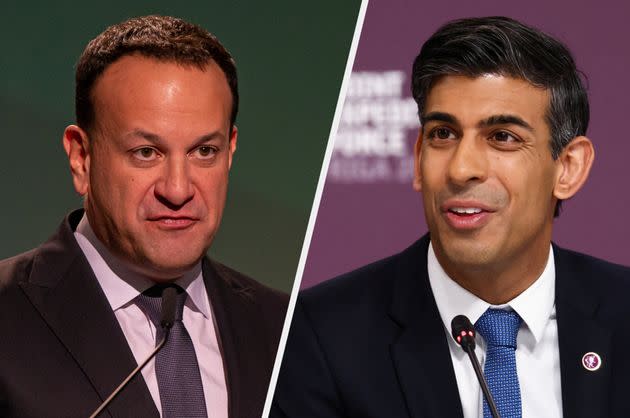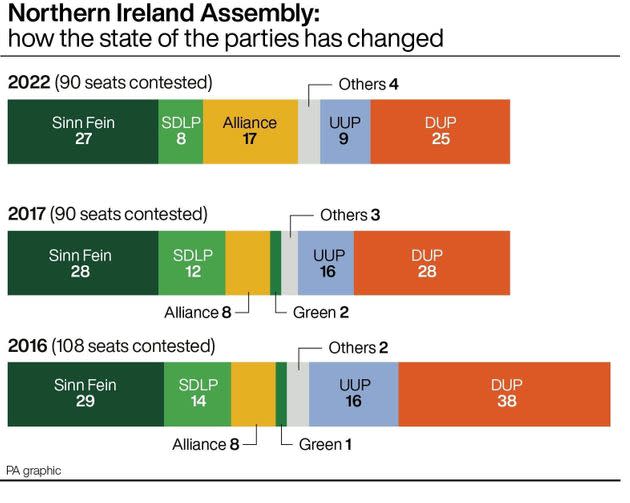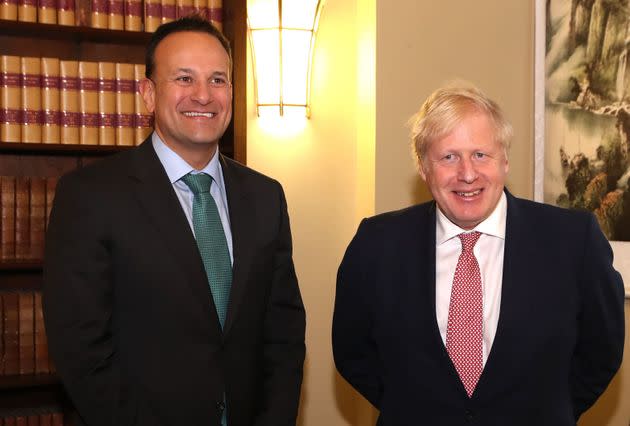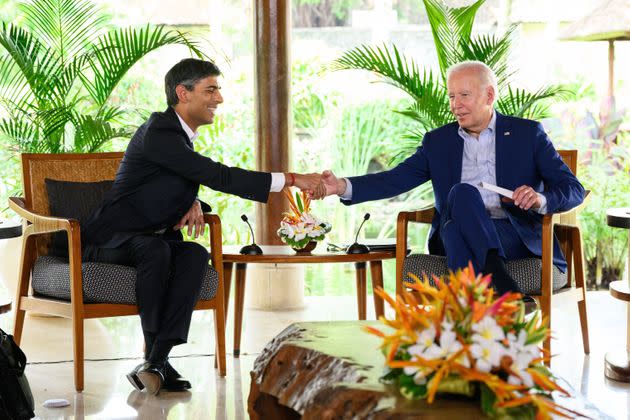Northern Ireland Protocol: Could The Major Brexit Obstacle Finally Be Resolved In 2023?

Leo Varadkar, Ireland's PM, has just hinted that the NI Protocol could be up for re-negotiation
The Northern Ireland protocol has reared its head again as the UK and the EU continue to quibble over resolving their ongoing tensions – but could 2023 be a turning point for both sides?
It comes after the new Irish prime minister suggested that the Brexit sticking point might actually be up for re-negotiation earlier this week – only for his spokesperson to later water his comments down.
Leo Varadkar, the prime minister (known as the Taoiseach in Ireland), returned to office for his second term in December.
He and former UK PM Boris Johnson actually negotiated the protocol back in 2019, and at the time it was heralded for helping to get a Brexit deal over the line after months of deadlock.
Three years later, it’s not looking quite so good – and many unionists in Northern Ireland aren’t happy, with some blaming Varadkar for his role in creating the protocol in the first place.
Varadkar’s suggestion that the flashpoint could now be re-negotiated is a key sign that it might – finally – be settled, but the reverse ferret from his representative has put the protocol’s future on unsteady ground again.
Meanwhile, over in the UK, new prime minister Rishi Sunak is very keen to put the issue to bed this year, so could there a resolution in the near future?
Here’s what you need to know.
What is the Northern Ireland protocol?
The UK was trying to negotiate the terms of its post-Brexit relationship with the EU in 2019, but talks were deadlocked.
As Northern Ireland is the only part of the UK with an EU border (with the Republic of Ireland) it presented a unique difficulty. What happens with trade?
The EU has strict trade rules, and the UK was going to be treated as a third non-EU country after Brexit, meaning any goods coming from it and going into the bloc need to be checked.
This would have just resulted in a hard border – but both the UK and EU were keen to honour the peace treaty from 1998, the Good Friday agreement, by not putting up a strict boundary between Northern Ireland and the Republic.
Then-PM Johnson suggested the protocol. This would involve putting a trade border down the Irish Sea between Northern Ireland and Britain.
Goods would be able to pass over the Irish border with ease as Northern Ireland would continue to follow the EU’s trade rules, despite leaving the bloc along with the rest of the UK.
The main issue with this suggestion was that goods coming from Britain and entering Northern Ireland would have to be checked.
Why does not everyone like the protocol?
Unionists in Northern Ireland have long argued that the protocol would split the region from the rest of the UK, leading to trade delays and food shortages.
These predictions have come true, to an extent. The largest unionist party, the DUP, has subsequently called for the protocol to be entirely redrawn, otherwise they will not enter a power-sharing government at Stormont with Sinn Fein.

Northern Ireland Assembly how the state of the parties has changed.
Sinn Fein supports the protocol, and gained the largest number of seats during the May general elections, but still needs the DUP’s cooperation for the Assembly to sit at all.
This is one of the essential peace-keeping terms of the Good Friday Agreement which rules Stormont must be a power-sharing coalition between Unionists and Nationalists.
The protocol has also not been fully implemented yet, as the UK is still in the grace period of the initial agreement, so more restrictions and obstacles to trade are on the horizon.
Why is it so important?
Well, not only is the protocol affecting the quality of life for many people in Northern Ireland who depend on functional trade, but politics is at a standstill.
The Northern Ireland Assembly, the devolved parliament, is not sitting because unionists in the DUP refuse to take their seats unless the protocol is resolved.
What does the EU say about renegotiation?
Up until recently, the EU was staunchly refusing to renegotiate much of the protocol.
Then-PM Johnson claimed last spring: “We have been told by the EU that it is impossible to make the changes to the protocol text to actually solve these problems in negotiations – because there is no mandate to do so.”
Varadkar’s latest comments seemed to have changed that, as he admitted that when the protocol was designed “perhaps it was a little bit too strict” on Tuesday.
He said: “I’m sure we’ve all made mistakes in the handling of Brexit.”
However, Varadkar did point out that Brexit itself was fraught with difficulties.
“There was no road map, no manual, it wasn’t something that we expected would happen and we’ve all done our best to deal with it.”
He added: “Brexit was imposed on Northern Ireland without cross-community consent.”
He suggested there was room “for flexibility and room for changes” – and claimed he shared this position with European Commission president Ursula von der Leyen.
He said: “We are willing to show flexibility and to make compromises. We do want there to be an agreement.”
But on Wednesday, his spokesperson said that it was not the Taoiseach’s “intention” to suggest that changing the text of the protocol was up for negotiation.
He said Varadkar was instead looking to suggest the “issue of flexibility is an important one”.
Varadkar has faced intense criticism from unionists during his time as deputy PM (Tanaiste) over his role in creating the protocol.

Johnson and Varadkar agreed the NI Protocol back in 2019
Demonstrators appeared outside the Irish parliament when he was appointed Taoiseach before Christmas, saying that the Good Friday agreement was “dead” because of Brexit.
Although his spokesperson seemed to backtrack on Varadkar’s comments, the EU has been softening slightly and indicated that it would agree to a less rigorous implementation of the protocol.
Previously, Ireland’s then-foreign minister Simon Coveney said changing the contents of the protocol would be a breach of international law, by delaying the moment the protocol comes into full force.
Varadkar has indicated that he intends to travel to Northern Ireland to improve relations, despite the frostiness from unionists.
What does the UK say?
For months now, the government has been calling for changes to the protocol.
Despite championing the entire concept, Johnson (when he was in No.10) acknowledged in May 2022 that unionist frustration meant the protocol had to be changed.
Now, the UK wants to get rid of checks and paperworks between Britain and Northern Ireland, while ensuring British goods which do not travel outside of the NI only need to meet British standards.
It also wanted to remove the European Commission and European Court of Justice’s authority over the protocol.
Sunak said he wants the entire row resolved by April – ideally on the 25th anniversary of the Good Friday Agreement – during his first face-to-face bilateral meeting with US president Joe Biden, who is invested in restoring relations in Northern Ireland.

Rishi Sunak shakes hands with President Joe Biden in November
What might happen next?
Talks have been happening since September, when Johnson officially stepped down from No.10.
They have focused on checks on goods and the role of European court of justice in trade disputes.
There may be more leniency with border checks from the EU after Varadkar pointed to the success of the UK’s unilateral decision not to impose full-fledged checks on goods arriving at Northern Ireland ports, as the EU originally wanted.
He acknowledged that this had not led to uncontrolled movements of goods going into the Republic, as 85% of goods arriving in Northern Ireland stay in its territory.
He explained: “We’ve seen that the protocol has worked without it being fully enforced. And that’s why I think there is room for flexibility and room for change.”
His comments were also perceived as a sign that talks between the EU and the UK are going to be ramped up in the coming weeks.
But pressure is mounting for a deal before January 19, which is the deadline set by the Northern Ireland secretary Chris Heaton-Harris to call fresh elections for Northern Ireland’s devolved government.
If by this date both the EU and UK can reach an agreement, a Northern Ireland election would follow in April.
It’s worth noting that Varadkar’s spokesman said that the Taoiseach had not yet spoken directly to Sunak since his re-election in December.

The Northern Ireland Secretary of State Chris Heaton-Harris

